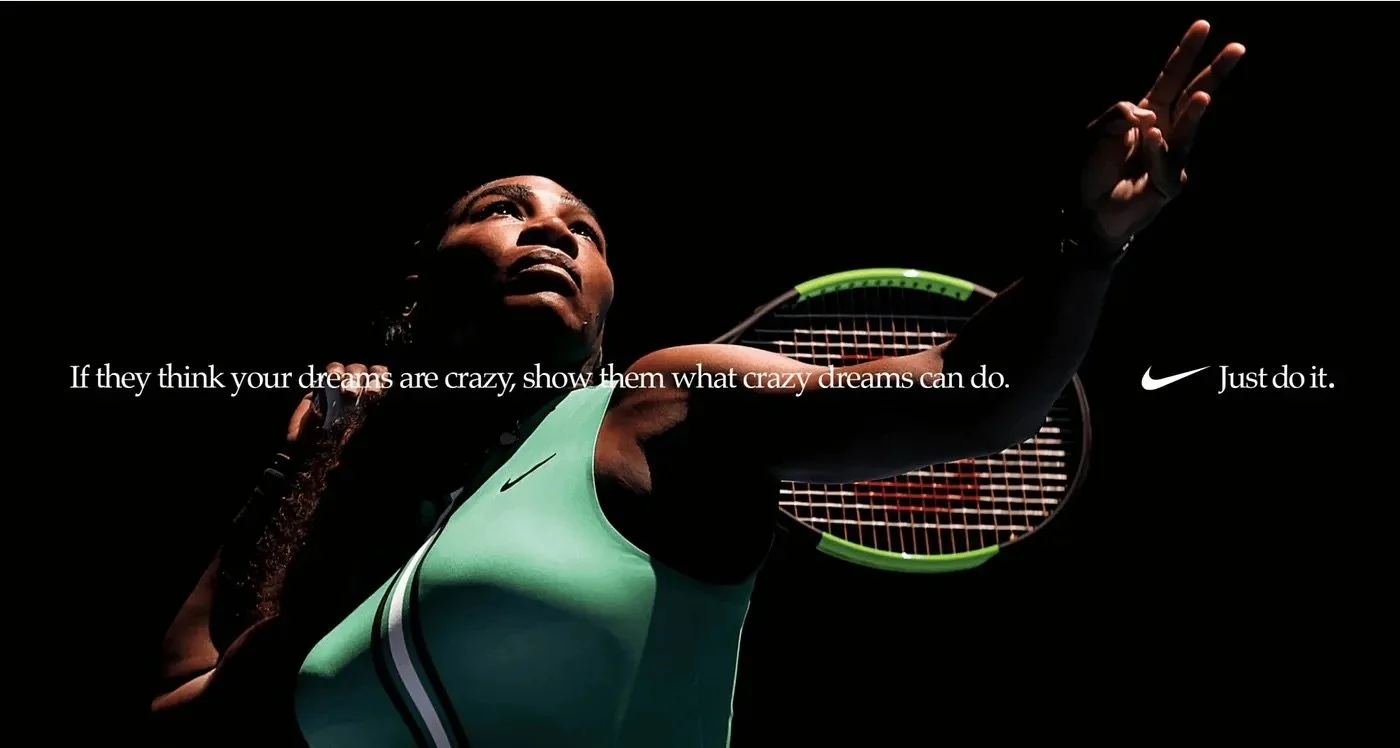Too Much, Not Enough – and Finally Seen: When Advertising Gets Us Right.
By Mia Motoki
Has anyone ever told you, “You’re too bossy,” “too strong,” or “too competitive,” trying to fit you into a mold that society has so carefully sculpted? Ever been called “crazy” for being a little too extra? Well, screw that. What’s so wrong with daring to chase the dreams we believe in? What’s so wrong with breaking free from expectations we never agreed to? Why should we live our lives to please everyone but ourselves?
Image courtesy: Nike
If you haven’t noticed yet, this is exactly what Nike is getting at with its “Dream Crazier” (2019) campaign narrated by Serena Williams. AKA, the legendary American tennis player who’s often faced public backlash, especially around issues of sexism. Stereotypes and social expectations have always been around, but in a world flooded with mass and social media, we’re more exposed than ever to society’s definition of the “ideal” female. Nike’s message? Challenge it. Rewrite it. Dream crazier.
“If we show emotion, we’re called dramatic. If we want to play against men, we’re nuts.
And if we dream of equal opportunity, delusional. When we stand for something, we’re unhinged… When we’re too good, there’s something wrong with us. And if we get angry,
we’re hysterical, irrational or just being crazy. So if they want to call you crazy, fine.
Show them what crazy can do.”
Nike’s advertising is the epitome of a resonating message. Gen Zers are often said to value brand “authenticity,” but with the word plastered on every billboard and post, mere authenticity no longer cuts it. What resonates now is authenticity with an edge – rebellion against the norms. It’s about breaking free from the patterns that have kept us confined in emotional bars. Looks like we’ve been the brief all along.
Gen Z’s rebellion isn’t just about rejecting authority or norms, though; it’s about regaining control over our own narrative. We’re a generation that’s constantly balancing being “too much” and “not enough” at the same time. But instead of shying away from this contradiction, Nike leans into it. In a society that often feels suffocating with external pressures and uncertainty, rebellion becomes a form of empowerment. It’s not just about defiance – it’s about growth.
Photo courtesy: The One Club
In fact, 74% of Gen Z (aged 21–26) say embracing their rebellious side has brought positive change, boosting their self-confidence (70%) and solidifying their convictions (57%). For us, it’s not just about challenging the system – it’s about finding our place in it and making our voices heard. Nike understands this shift, and their approach goes beyond simply mirroring Gen Z’s desires; they tap into it, turning our complexities into something powerful.
Gen Z is anything but predictable. We don’t like following labels or trends, rather than making them. Just when marketers thought “authenticity” was the golden ticket, it started to feel superficial. Then came the era of rebellion, but even that’s evolving. So how does Nike continue to stay embedded in Gen Z culture? It’s the unapologetic grit.
The “Winning Isn’t For Everyone” (2024) campaign spotlights a collective of the world’s greatest athletes, all relentlessly driven by victory. With an unapologetic message, “There’s nothing wrong with wanting to win,” Nike pushes back against the notion that ambition needs to be toned down. Because why should it?
Chasing your dream. Fighting for your win. Just because. Playing your game with a purpose is what defines you, not material possessions. For Gen Z, the ultimate flex isn’t what you own; it’s how you live your life with grit. Nike’s message in this campaign resonates because it tells Gen Z that ambition and striving for success are not just accepted but celebrated.
Photo courtesy: NIke
With a bold statement that cut through the noise of Paris 2024 Olympics ads, the posts garnered 228,000 likes and 78,000 shares on Instagram — well above Nike’s usual performance.
Following “Winning Isn’t For Everyone,” Nike takes it a step further with “Winning Isn’t Comfortable” (2024), tapping into the often inner voices that come with striving for success. It’s easy to focus on the glory of victory, but the real power lies in the pain and discomfort of pushing yourself through the tough moments. The message? The pain is the “joy.” “Winning doesn’t always feel good.” But people do it anyway because they’re driven. They have dreams to chase. They want to win for themselves.
For Gen Z, this message hits differently because we know that success isn’t just about the end result – it’s about the journey and the hurdles we overcome along the way. Nike has built a campaign that speaks of our lived experiences: ambition is hard, and it often hurts, but the pursuit of greatness is worth every bit of struggle.
Image courtesy: Ads of the World
Gen Z’s response to the campaign was evident, particularly with the “Stairs” (2024) ad. It drove a 16% increase in purchase intent among 18-35-year-olds, double the 8% increase seen in older demographics. GenZ also resonated more with the humorous yet relatable insight behind “Winning Isn’t Comfortable,” leading to the highest brand equity score across all age groups.
Nike has a knack for understanding the emotional and cultural shifts that define Gen Z — a generation of contradictions: sensitive but bold, too much and not enough. But Nike doesn't just reflect that tension — they embrace it. By tapping into the evolving definition of authenticity, Nike makes sure their messages hit home, no matter how we change.
Whether it’s embracing our rebellious spirit, unapologetic grit, the imperfections we’re learning to love, or the struggles that shape us, Nike truly gets what it means to be Gen Z. They understand the real us at our core – the complexities that make us who we are. They know that for Gen Z, authenticity is not a static trait but a dynamic force that evolves as we do.
Nike’s campaigns don’t simply talk at us – they create a culture and engage us in a bigger dialogue about what it means to truly be ourselves in a world that's always trying to define us.
“Just Do it” — no matter what the world tells us.




